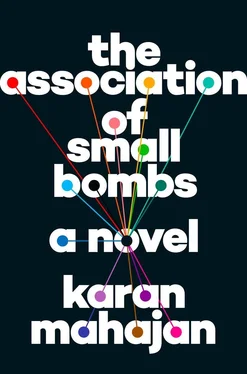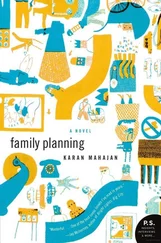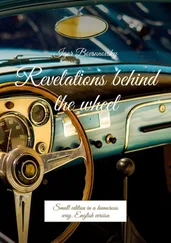“I thought you were getting better,” Ayub said.
“So it’s continuing repetitive stress injury?” Tara asked, not blinking her eyes much beneath her steel-rimmed John Lennon — style glasses, glasses that were so clear that they seemed like dividers separating one world from the next, the world of wealth and good skin (she had radiant skin) from the world of activism. As the daughter of a doctor, she was fluent in the language of sickness.
“Yaah, I believe,” Mansoor said. “Carpal tunnel, repetitive stress, whatever you want to call it.”
It was only later, when the other members had come and gone and the meeting was over, that Ayub said, “Will you take a walk with me?”
“Of course.” Mansoor lifted the Bittoo notebook he’d kept on the floor next to him. He hadn’t even opened it once today and it was somehow glued to the floor and he had to pry it up. “Arre.” He laughed.
Ayub, tall and hunched, bringing his palms together, laughed too, politely, eyes popping with delight a bit too late.
The brick complex near the hospital contained the Department of Tourism and also several shops — Flavors Restaurant, a toy shop, a kebab place; the normal assortment you find in a community center. Navigating the cool corridors, damp from mopping, alive with a potent lemony smell (one that must have been coming from a shop rather than the floor, since that was not the kind of mopping these places got) the air cold and making them shiver, Ayub asked, “So how long have you had these muscle problems?”
“Six years. Since the blast.” He was hypnotized by the sound of Ayub’s slippers thwacking the ground: that urban music.
“That’s a long time,” Ayub said. “What kind of treatment did you get?”
Mansoor told him: the physiotherapy, the exercises, the ultrasonic machine, the biosensitization, the alternating baths, the splints, the weights, the Volini gel, the words coming out like verses of some elegant, enigmatic poem.
“But what do the doctors say now?”
“That it’s been a relapse. Basically, I was healing but I developed microtears in my wrists from typing too much.” He was so fluent in this language too.
“I hope you don’t mind my saying,” Ayub said. “It shouldn’t be there after so many years.”
Mansoor looked at him.
“You see, I’ve been watching you since you came in,” Ayub said. “You remind me of myself. You’re sensitive to the pain of others but not so much to your own pain, isn’t it? But here’s the issue. Any pain that lasts this long — well, it can’t. Pain is supposed to heal. When an injury doesn’t go away at our age, it’s psychological, no matter the cause.” Standing tall in a striped blue Fabindia shirt — the stripes powerful and downward, red and green — wearing a gray woolen waistcoat over it, clapping his palms together, Ayub looked like both a politician and an abashed lover who has waited too long to make his declaration.
Ayub scooped back his combed hair. For the first time Mansoor saw that, at the age of twenty-seven, Ayub was balding already. The hair was carefully arranged, in powerful forward strands, to cover up the terra firma of the pate.
“I’m not saying your pain isn’t real or the injury isn’t real. I’m simply saying that the pain remains after the injury has healed.” Ayub clapped his palms together again, as if it helped maintain his balance, as it were the steering wheel or joystick of the conversation. “When I was your age and I moved to Delhi, I had a bad scooter accident. I was riding pillion and my friend’s scooter skidded — there was a motorcycle coming toward us in the wrong lane; it was Holi and the driver’s eyes were red and he had clearly drunk bhang, because he was smiling as he skidded — and we went sliding on the road, like this”—he made a gesture with his palms that you may make to mimic the flight of a jet—“and I rolled off and only narrowly avoided being run over by a Tempo. We were young, so we laughed it off, but then I started developing horrible back pains.” His eyes went dark as he remembered. “It was so bad, yaar. It used to keep me up at night. I couldn’t walk, talk, read — anything. And I tried everything: Reiki, yoga, yunani, ayurveda, homeopathy. You think of it and I tried it.” He paused. “It was only after some years when I realized that my pain was psychological and that I was holding on to it because I was addicted to it that it went away. It was only when I started praying and not thinking of myself that it went away. When I gave myself to Allah.” Ayub had rich, long lashes that throbbed oddly when he was excited. He was a bit like a bulb that hasn’t quite learned to hoard all its electricity into light and so emits it through twitches — in Ayub’s case, of the hands, eyes, feet; Ayub was always sitting on the floor of the NGO, on the white terrazzo broken into squares by black lines, rotating his feet like they were radars processing the conversation — only to suddenly burst into cogent argument.
Mansoor now considered Ayub, his advice, his well-meaning invitation to stroll in the market, his height, his stoop, his provincial sureness about whatever quackish solution he’d discovered, the power he must feel giving advice to people much richer than himself, the joy he must get out of pitying Mansoor, his expectant look, and said, “It could be true.” He blinked deeply himself.
Now Ayub became excited. “In fact, the way I solved it was by reading Dr. Mari’s book The Religion of Pain . He brings up the issue also and suggests you do visualization and don’t focus on your body. Between that and prayer, five times a day, I healed. You will too. I’ll bring you the book and we can go to the mosque together.”
“Thank you,” Mansoor said.
Instead, that day, enraged in a way he could not understand, he vowed not to return to the meetings at all.
“Papa, I want to do the IT traineeship,” Mansoor said the next evening.
His father was sitting on the bed, his buttocks slumped forward under him and his stomach jutting up and out. A pack of cards with an elegant red paisley design on their backs — the same design Mansoor had noticed in the jaali work of the mosque near the university in Jamia — was spread next to him in an arrangement of solitaire. Sharif, his spectacles low on his nose, kept a couple of cards on his stomach for consideration. The floppy pipes of his white pajamas revealed thin white hairy ankles. “If you feel like it is the right thing, sure.”
“Yaah, I’m feeling a lot better and it’s good if I start and get work experience,” Mansoor started, but then stopped. His father, dipping a card into one of the simultaneous stubby rivers of the solitaire piles, wasn’t listening.
________
“The only issue is — are your wrists OK?” Afsheen said, carrying a bowl of fatty chicken bits swiftly back and forth in the kitchen. Her bun was done up perfectly and her forehead looked unlined and she was wearing one of her elegant purple-gray caftans. Tragedy had made her erect and confident.
“They’re fine, Mama,” Mansoor said, in the artificial unintelligible rush of the kitchen. “I don’t want to talk about them. And please don’t use them as an excuse for… our problems.”
“Yaar, Razia, I told you to put the onions here,” Afsheen said to the maid.
“Ji, madam,” Razia said.
“Where will you do it?” Afsheen asked Mansoor.
“Mahinder Uncle’s friend is an executive at Xansa,” Mansoor said, his back to a counter — the back suddenly aching, crossed by a vertical sting of pain and the horizontal hardness of the slab of counter.
“I see. You think you can sit in an office all day?”
Читать дальше












